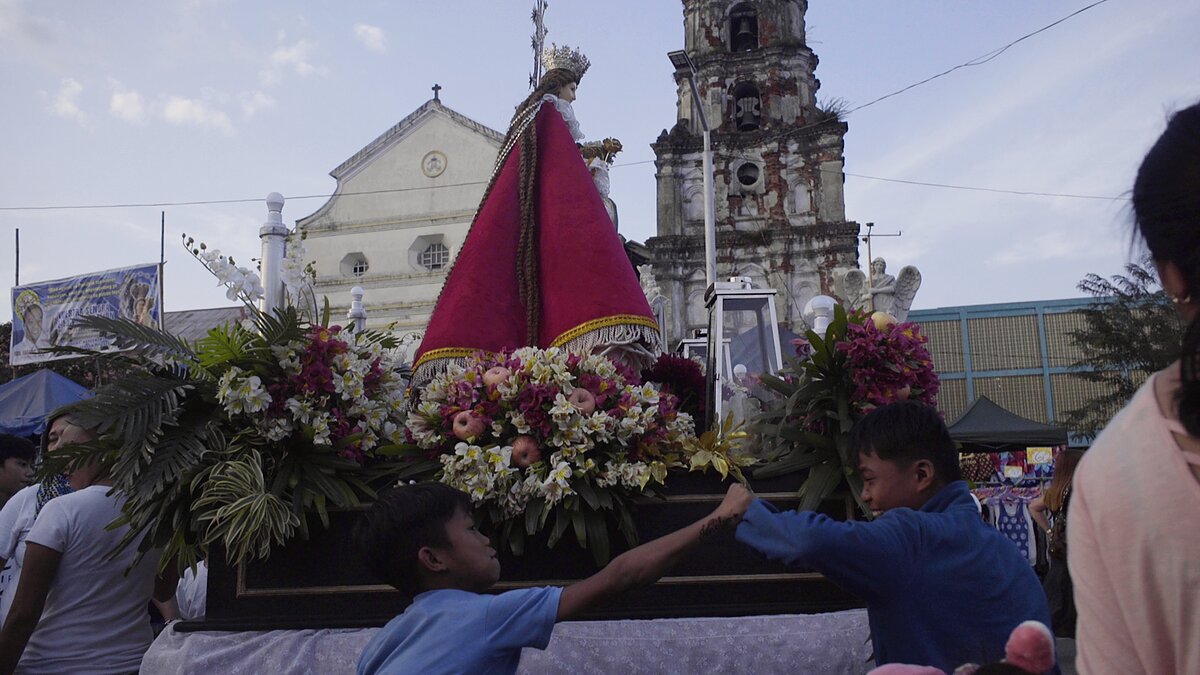“Nowhere Near” Reflects the Fractures of Being an Undocumented Filipino American
In his newest documentary, Nowhere Near, filmmaker Miko Revereza shares that he views his films as “assemblages of wounded parts.” Like a surgeon, he sutures together fragmented scenes and sights from his life to make sense of a fractured American Dream. The film, which debuted at this year’s New York Film Festival, is a ruminative feature seven years in the making that traces all the visible and invisible scars left by his own family’s experience as “TNT” (tago ng tago, or “hiding and hiding”)—undocumented Filipino immigrants in the U.S.
By scouring Google Maps and touring family tombs blackened by erosion, Revereza and his family attempt to recover the piecemeal parcels of their history. As his camera scans through census records, family photos repurposed for passports, and maps of the U.S. and the Philippines, Revereza narrates with sobering curiosity, asking: How does one map a family history long uprooted? How does one find their roots in a country fractured by more than three centuries of colonization, occupation, and imperialism?
Nowhere Near enmeshes the personal and the political in his family’s quest, ever cognizant of a compromised sense of belonging, even in their own homeland. Revereza’s camera captures the entanglements of American imperialism in his family’s ancestral land in the Pangasinan province. He shows a fighter plane in Veteran’s Memorial Park, which memorializes the Lingayen Gulf Landings when Filipino freedom fighters and Allied Forces fought against Japanese forces.
Observing his lola’s difficulty in finding a family grave among unfamiliar tombs added since her departure, Revereza contemplates how their ancestral land grew more unrecognizable to them. It also prompts him to wonder aloud about the ways in which the soft power of Western commodities has kept the embers of the American Dream alive in places like the Philippines. “They [the American WWII soldiers] came armed with bubble gum, coca-cola, and jazz,” he says. “When they left, we began to long for them toward Berkeley, Stockton, and San Jose, a process of uprooting the family.”
In gleaning pieces of the past, Revereza also laments all the pieces of his family’s life and legacy that have floated into the haze, just out of reach. In one scene, Revereza is seen recording himself standing outside the office of his family’s immigration lawyer in Los Angeles, hoping to excavate answers about his family’s rejected green card applications in the xenophobic wake of 9/11. Yet, he finds himself frozen with his camera in the lobby before a security guard kicks him out. Unable to act out a fantasy of “going full-on investigative journalist” on the lawyer, he is resigned to incomplete answers about his family’s status. It’s also a scene that deflates his hopes of confronting the immigration system head-on.
Throughout the film, Revereza makes frequent and poignant use of double exposures; superimposed images that build multilayered pictures. In one particular scene, he overlays footage of flowing water onto images of his loved ones—a metaphor for a drifting sense of Filipino identity caused by geopolitical tumult.
In many ways, Nowhere Near threads together themes explored in Revereza’s previous works. His 2017 short film Disintegration 93-96 is a pointed examination of his father’s patriarchal authority within the lens of assimilation. Meanwhile, Distancing (2019) contemplates his homecoming to the Philippines. His guerrilla diaristic feature No Data Plan (2019), captures his three-day Amtrak journey from Los Angeles to New York on an expired DACA that disallowed him from flying.
In the closing scene of Nowhere Near, the film takes a meta view of Revereza’s work. The camera loiters on his script as his hand grips a pen. Through this framing, the audience reflects on the director’s handiwork at the same time that he is. And although Revereza cannot retrieve every wounded part of his family’s diasporic legacy, with Nowhere Near, he has taken the broken pieces he has been able to salvage and formed them into a shape of its own, a reflective prism.





